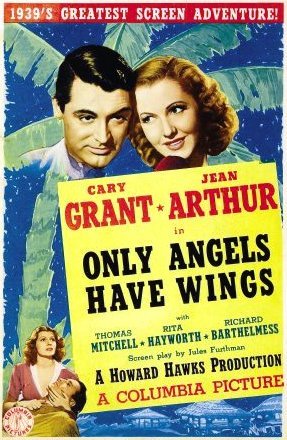Forget The Heckler and The Spectator, The Statesman was already there
#1Forget The Heckler and The Spectator, The Statesman was already there
Posted: 4/24/15 at 5:08pm
The article about Mr Sondheim by The Heckler in The Spectator that so incensed so many on this board last month is easily overshadowed by this far superior assessment of his career that appeared in The New Statesman in January but has just come to my attention now:
http://www.newstatesman.com/culture/2015/01/stephen-sondheim-life-s-work-progress
#2Forget The Heckler and The Spectator, The Statesman was already there
Posted: 4/24/15 at 5:47pm
It's a more thoughtful piece, though I feel like it's a bit of a ramble that never really gets to a point (but that's true of a lot of similar pieces.) I kinda bristle at the belief that the majority of Sondheim fans "now" are incapable of having even the slightest negative opinion to anything he's written. But my one big frustration is he falls into the standard trap of not *once* mentioning the contributions of any of the book writers (and certainly in the case of Prince, the directors) who helped conceive and shape the works--surely when mentioning Merrily's backwards plot structure that should hold some argument. (and personally, while I largely enjoyed Friedman's production, I think it would be a much duller show if she had reversed that,)
After Eight
Broadway Legend Joined: 6/5/09
#2Forget The Heckler and The Spectator, The Statesman was already there
Posted: 4/24/15 at 8:20pm
I noted with interest the rubric under which this article appeared:
"The latest in books and the arts."
"The latest?" When was the last time Sondheim wrote something new?
Well, this article certainly can't compare to that wonderful piece in The Spectator, but I do think the author sums up the Great One's devotees' mindset and attack methods very well, as we've witnessed in thread after thread on these boards:
"To his admirers, overzealous in defence, Sondheim has become a writer of musicals that never – not for even a minute – repelled a thoughtful audience with ostentation in wordplay or desperation in rhyme, with underfed melodies or overworked parodies, with glibness or gloom. A reluctance to cheer equals a failure of discernment. If you’re not part of the ovation, you’re part of the problem. And so a composer-lyricist who dares to alienate and annoy is borne heavenwards on a wave of what Steyn called “popular unpopularity”."
Exactly.
Updated On: 4/24/15 at 08:20 PM#3Forget The Heckler and The Spectator, The Statesman was already there
Posted: 4/24/15 at 8:28pm
You two need to make babies.
#4Forget The Heckler and The Spectator, The Statesman was already there
Posted: 4/25/15 at 8:27am
After Eight, I agree that it is obnoxious to attack those who happen to dislike Sondheim for lack of discernment. However, I don't see that happening here very often. Those who engage civilly on the topic have generally been greeted with a civil, if spirited, response.
I would hope that you would realize that it's equally obnoxious to accuse those who love Sondheim's work of having no discernment. You'll deny it, but you do this on a regular basis (and worse: I think you've implied in the past that only a person of poor character could love Passion).
After Eight
Broadway Legend Joined: 6/5/09
#5Forget The Heckler and The Spectator, The Statesman was already there
Posted: 4/25/15 at 10:27am
"After Eight, I agree that it is obnoxious to attack those who happen to dislike Sondheim for lack of discernment. However, I don't see that happening here very often."
Maybe because few here dare to criticize Sondheim to avoid just the sort of disparagement described in this article.
"Those who engage civilly on the topic have generally been greeted with a civil, if spirited, response."
"Generally," you say? Mmm... "Spirited?" Is that how you put it? Interesting...
May I also remind you that the author's comments are not restricted to the members of this message board? They point out the mindset and behavior of Sondheim idolaters everywhere, and quite accurately, I might add.
#6Forget The Heckler and The Spectator, The Statesman was already there
Posted: 4/25/15 at 12:46pm
Rereading the article, I'm struck by how dismissive the writer is of virtually ALL of Sondheim's work after SUNDAY... He really seems to have quite the ax to grind here, and is intent on toppling idols right and left.
It's also a piece littered with factual errors. Just one easily verifiable one: Walter Kerr wasn't the Times critic of note during the Sondheim-Prince era; Clive Barnes was!
#7Forget The Heckler and The Spectator, The Statesman was already there
Posted: 4/25/15 at 3:35pm
Walter Kerr wrote the Sunday after opening reviews for most shows during the 70s in the NYT. Many producers hoped or dreaded what the 2nd opinion from the paper would be. He reviewed all the Sondheim/Prince shows, giving them mixed to negative reviews.
He was more charitable to very commercial shows during that time. He wrote an extremely favorable review of Seesaw -which Barnes panned- that the producers used at the center of their print ads for the duration of its run.
He was very much not into that new fangled "concept musical" idea. Sometimes I think After Eight is his ghost.
#8Forget The Heckler and The Spectator, The Statesman was already there
Posted: 4/25/15 at 3:46pm
I don't hate Sondheim's work (love some of it), but the author has a point. There is an elitism among Sondheim fans, where they feel that they are more intelligent than others because they like shows like Sunday or Into the Woods. I'm not saying every fan is like that, or that you aren't allowed to love any show you like, but with Sondheim shows in particular the fans act like the fact that they love his shows makes them better. It's extremely frustrating.
Showface
Broadway Legend Joined: 6/25/14
#9Forget The Heckler and The Spectator, The Statesman was already there
Posted: 4/25/15 at 5:18pm
I think there is a little bit in almost every fan-base (Theatre-fans in general can be a little bit elitist about theatre), so to pin it to the Sondheim fan-base is a head-scratcher for sure. But, what makes Sondheim different? Why is the small amount of elitism exaggerated to such heights? Because, his entire fan-base is not just limited to these boards (if you feel elitism is so strong here), it's difficult to say an entire group of people are mostly elitist.
#10Forget The Heckler and The Spectator, The Statesman was already there
Posted: 4/25/15 at 5:45pm
"Walter Kerr wrote the Sunday after opening reviews for most shows during the 70s in the NYT." It seems you are correct and I am correct as well. Both Kerr and Barnes wrote theater reviews for the NYTimes during the 70's, although it is the reviews of Clive Barnes I remember reading with more eagerness. Obviously the Statesman article would cite the reviews by Kerr since they further his argument better: he hated most of what Sondheim/Prince were trying to do with the American musical. By contrast, here's a favorite Barnes review of my favorite of all their shows together:
February 26, 1973
The Theater: 'A Little Night Music'
By CLIVE BARNES
![]() t last a new operetta! At last resonances and elegances in a Broadway musical. "A Little Night Music," which opened at the Shubert Theater last night, is heady, civilized, sophisticated and enchanting. It is Dom Perignon. It is supper at Laserre. It is a mixture of Cole Porter, Gutav Mahler, Antony Tudor and just a little of Ingmar Bergman. And it is more fun than any tango in a Parisian suburb.
t last a new operetta! At last resonances and elegances in a Broadway musical. "A Little Night Music," which opened at the Shubert Theater last night, is heady, civilized, sophisticated and enchanting. It is Dom Perignon. It is supper at Laserre. It is a mixture of Cole Porter, Gutav Mahler, Antony Tudor and just a little of Ingmar Bergman. And it is more fun than any tango in a Parisian suburb.
It is set in Sweden at the turn of the century. It is also the turn of the year. Those mysterious white nights in Sweden, when people smile and go mad to the sound of the folk dancing and the breaking of hearts and schnapps glasses.
Hugh Wheeler, who has written the book, got his suggestion from that old and lovely Bergman movie -- one of the director's few comedies -- "Smiles of a Summer Night." It is not too like the film, which in a musical works to its advantage.
A lawyer has married some 30 years beneath him, and after 11 months of marriage his child-bride, beautiful, delicate and wondering, is still a virgin. One impulse, his visits an old -- but not too old -- actress friend of his, and is discovered, most compromisingly, by her hussar lover. The hussar's wife offers to put everything right, by establishing the fidelity of her husband's mistress. The actress's mother, who takes care of her daughter, is persuaded to invite the lawyer, his son, who is madly in love with his mother-in-law, and of course, the wife together with a strayly amorous servant, to a country weekend at her villa. The hussar, and his loyal wife, intrude.
And that is only the first act.
Mr. Wheeler's book is uncommonly urbane and funny, and the very real sophistication has considerable surface depth. Yet perhaps the real triumph belongs to Stephen Sondheim, who wrote the music and lyrics. The music is a celebration of 3/4 time, an orgy of plaintively memorable waltzes, all talking of past loves and lost worlds.
Despite the idea of a waltz-musical, which somehow suggests one of Strauss's, or the title, so redolent of Mozart, it seems that Mr. Sondheim is aiming at the lilt of Mahler. There is a peasant touch here, a sense of country values. For all its sophistication it is a story in which the stables are more important than the chandeliers.
Then of course there are Mr. Sondheim's breathtaking lyrics. They have the kind of sassy, effortless poetry that Cole Porter mastered. The mother announces grandly: "I acquired some position -- plus a tiny Titian," and this is coming from a lyricist who only seconds before has dazzingly made "raisins" rhyme with "liaisons." Grace is abounding -- who but Mr. Sondheim would dare: "The hip-bath, the hip-bath, how can you trip and slip into hip-bath." You have to be very hip, and Mr. Sondheim is.
It is also a particular triumph for the producers and director, Harold Prince. For years he has been attempting to bring -- or so it has seemed to me -- something of the sensibility of the serious lyric theater, specifically perhaps the ballet, into American musicals. Here he has pulled it off in a way he didn't in "Follies" or "Company."
The mood is here perfectly placed. The choreography -- subtly, almost unnoticeably, contrived by Patricia Birch -- helps, but the profile of the show, its style and pattern, is practically palpable. People have long been talking about Mr. Prince's conceptual musicals; now I feel I have actually seen one the actual concepts.
Boris Aronson's scenery is, oddly enough, good only in patches. The swiftly shifting patterns of the show (which reveals its cinematic derivation here) have given Mr. Aronson the difficulty of constantly changing scenes, which he solves with screens of silver birches.
These, while decorative enough, become a little tiresome. However, his villa is a delight, and he has devised a front-cloth that is pure Swedish Drottningholm baroque. The costumes by Florence Klotz are sumptuous and knowingly aware, while the lighting by Tharon Musser puts all the soft and cold smiles into this particular summer night.
Finally, but not least, the performances. Casting, in the past, has not always been as princely as this producer's other activities. Here he gets it right, first time around. Hermione Gingold is immeasurably grande dame as the almost Proustian hostess (I haven't loved her so much since she sang about the Borgia orgies 30 years ago) and all are cut to style.
The misty-voiced and glistening-eyed Glynis Johns was all tremulous understanding as the actress, and Len Cariou was delightfully and jauntily battered as the husband whose wife doesn't even know him, let alone understand him.
Laurence Guittard was a splendidly stuffed hussar, Patricia Elliot decently spirited as his wife, Victoria Mallory all sugar as the virgin wife, and D. Jamin-Bartlett sensationally all spice as the less than virgin maid.
"A Little Night Music" is soft on the ears, easy on the eyes, and pleasant on the mind. It is less than brash, but more than brassy, and it should give a lot of pleasure. It is the remembrance of a few things past, and all to the sound of a waltz and the understanding smile of a memory. Good God! -- and adult musical!








